Most Uganda women don’t report violence due to criminal justice system mistrust - survey
A national baseline survey released by the International Justice Mission (IJM) in Kampala on August 11, 2025, attributes the anomaly to lack of trust in the country’s criminal justice system.
The Director of Public Prosecutions (DPP) Lady Justice Jane Frances Abodo launching the International Justice Mission (IJM) Uganda Violence Against Women and Children (VAWC) National Baseline Report. (Photo by Mpalanyi Ssentongo)
_________________
The majority of cases of violence against women and children go unreported, a new report says.
A national baseline survey released by the International Justice Mission (IJM) in Kampala on August 11, 2025, attributes the anomaly to lack of trust in the country’s criminal justice system.
The findings of a year-long study executed with the help of the global research consultants, International Research Consortium (IRC), left stakeholders pondering how to boost people’s confidence in Uganda’s criminal justice system.
The 128-page report sheds light on the high prevalence of violence against women and children in Uganda.
One of the key highlights of the report included the low levels of violence reporting, with 72% of incidences of physical and sexual violence against women going unreported.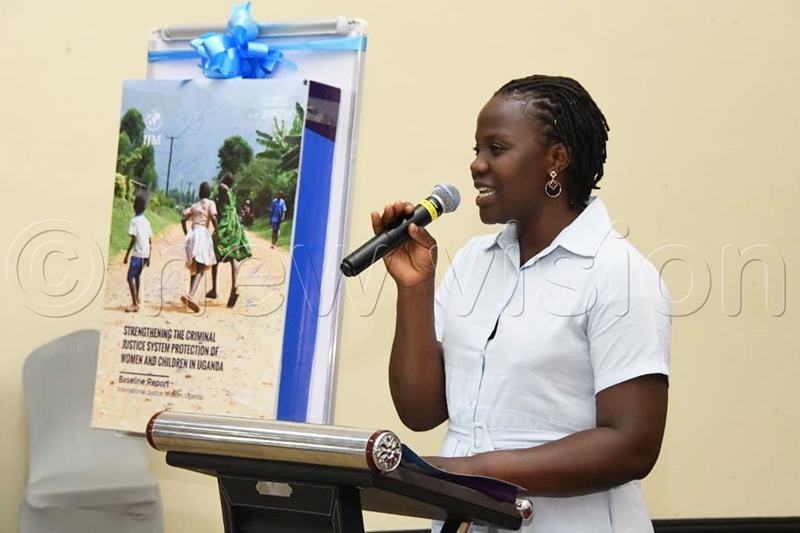
Sawiya Lakareber of Global Survivors Network sharing her story during the launch of the report. (Photo by Mpalanyi Ssentongo)
This is despite the high prevalence of intimate partner violence (violence among couples) and sexual violence against children.
The IJM is a global organisation that protects vulnerable people from violence. IJM partners with local authorities to rescue victims, bring criminals to justice, restore survivors, and strengthen justice systems. IJM has offices in Africa, Europe, Latin America, North America, and Asia. IJM began operations in Kampala, Uganda, in 2004.
Reviewing the report, Daniel Kibuuka Musoke, from IRC and the lead researcher, said the baseline assessment conducted from August 2023 to September 2024 revealed that stakeholders within the justice system have low confidence in the criminal justice system’s effectiveness.
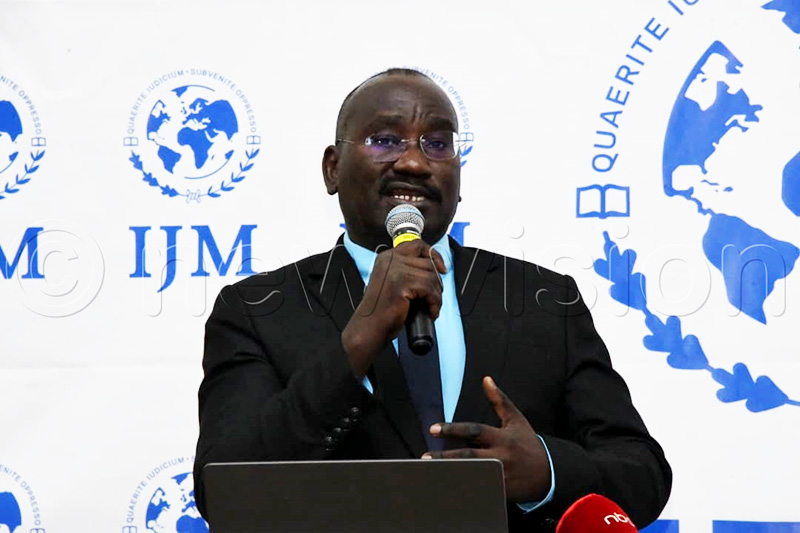
Dr Daniel Kibuuka Musoke presenting the findings in the International Justice Mission (IJM) Uganda Violence Against Women and Children (VAWC) National Baseline Report. (Photo by Mpalanyi Ssentongo)
“Only 18% expressed confidence in the system’s effectiveness across co-ordination, rule of law, public support and effectiveness in crime deterrence,” he said.
He indicated that it was only 6% expressed confidence in the full criminal justice system chain: Police, prosecution and courts, to manage these cases effectively.
According to the report, only 7% believed criminal justice system agencies provided timely services.
The sample size of the study included 2,225 of the ever-partnered women, 733 girls, 393 boys, 68 stakeholders, and 410 completed case files, among others.
Journey to streamline system
Director of Public Prosecutions (DPP), Jane Frances Abodo, who presided over the report launch as chief guest at Mestil Hotel, Nsambya, Kampala, welcomed the report as a pivotal moment in the shared journey to streamline the criminal justice system in Uganda.
“Uganda aspires to be a nation where every citizen enjoys safety, dignity, and equal protection under the law, as enshrined in our Constitution and our commitments to international conventions like the Convention on the Elimination of All Forms of Discrimination Against Women (CEDAW) and the Convention on the Rights of the Child,” Abodo said.
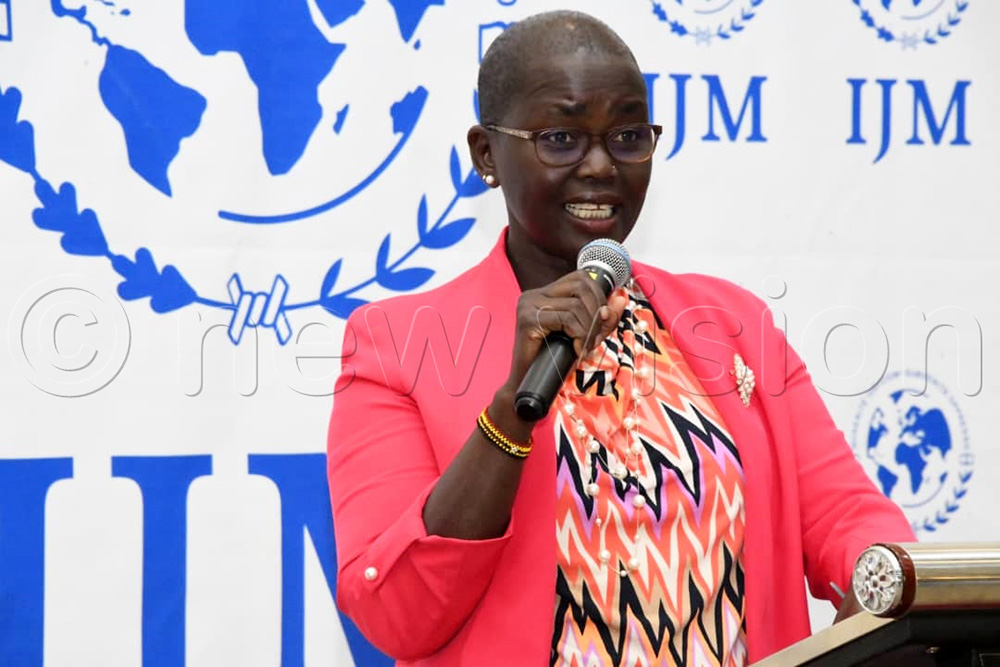
The Director of Public Prosecutions (DPP), Lady Justice Jane Frances Abodo, making her remarks. (Photo by Mpalanyi Ssentongo)
According to Abodo, the baseline survey was a critical step towards realising the aspirations with its comprehensive assessment of the challenges faced in combating violence against women and children and the insights it offers to guide the state policies and actions.
“The findings of the national baseline study are both sobering and pressing. The prevalence of intimate partner violence (IPV) and sexual violence against children in Uganda is alarming,” Abodo said.
The report revealed that out of 410 case files reviewed, nearly half of IPV and SVAC investigations were closed or inactive, often due to interference, bribery, or informal settlements.
It added that in most cases, 98% of reviews resulted in arrests, only about one in four (24%) victims reported trauma-informed engagement.
Important to note, however, seven in 10 (72%) victims felt they were treated well by justice actors during interactions.
According to Abodo, the overwhelming incidents of the crime that go unreported signalled a profound lack of trust, accessibility, or awareness of the justice system’s role in protecting victims.
“The reporting gap is a serious call for all criminal justice actors, right from the police to the prosecutors, judiciary, and local leaders. It is on us to rebuild faith in the system and ensure that every victim feels empowered to seek justice,” Abodo said.
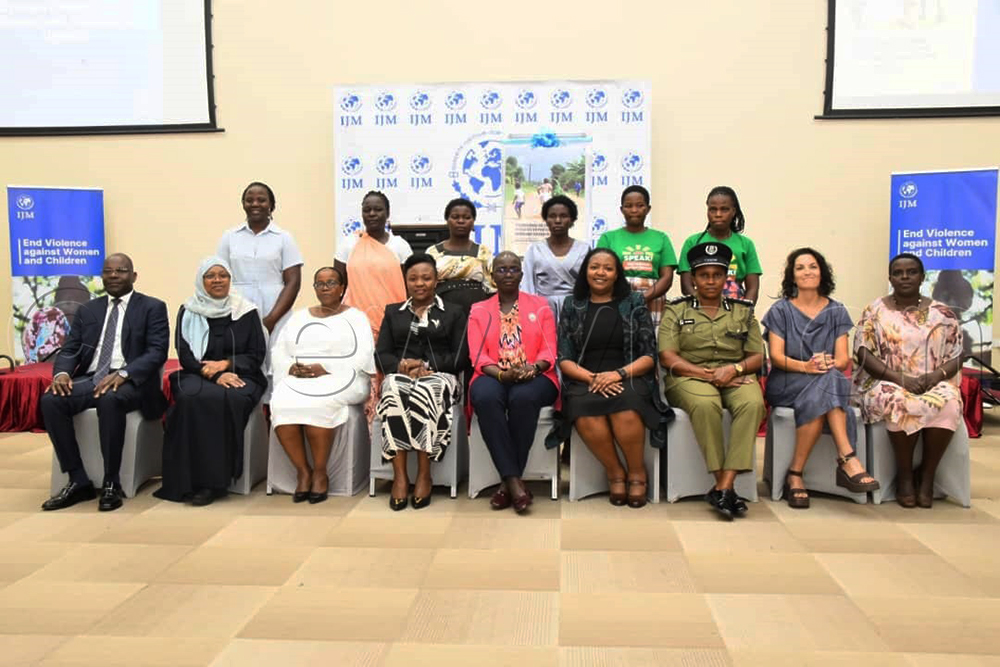
The chief guest, Lady Justice Jane Frances Abodo poses for a photo with other stakeholders during the launch of the International Justice Mission (IJM) Uganda Violence Against Women and Children (VAWC) National Baseline Report. (Photo by Mpalanyi Ssentongo)
Three in five children (58.6%), according to the report in Uganda, have experienced sexual abuse in their lifetime.
The perpetrators
“Close relatives and friends, including aunties, uncles, siblings, fathers, and peers, were found to be the most common perpetrators of SVAC. SVAC is three times more prevalent among girls (77%) compared to boys (24%), with most cases affecting children above 15 years,” Kibuuka said.
Kibuuka added that only 12% of incidents of physical or sexual violence involving women were reported to criminal justice agencies, and 16% were reported to non-criminal justice system actors in the past 12 months.
He added that the factors that contributed to the non-reporting included stigma, fear of retaliation, normalisation of abuse, and low trust in the criminal justice system.
IJM country director Wamaitha Kimani disclosed that the study, through credible qualitative and quantitative study methods, assessed four core protection domains: Prevalence of domestic violence and sexual violence against children, the reliance of victims of domestic violence on the criminal justice system and the confidence of key stakeholders in the criminal justice system.
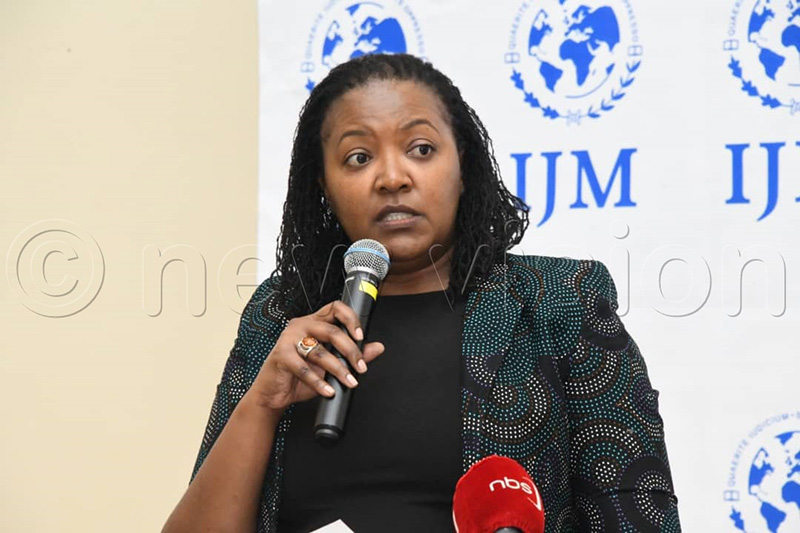
Wamaitha Kimani, International Justice Mission (IJM) County Director, speaking during the launch of the report. (Photo by Mpalanyi Ssentongo)
The other domain was the performance of the key criminal justice system agencies in responding to cases of violence against women and children.
“Actors in the GBV referral pathway (local council one, Police, medical/ health practitioners, traditional, religious and community leaders, psychosocial support providers and legal aid organisations) must be aware of the critical role they play as first respondents,” Wamaitha said.
She noted that IJM aims to protect 24 million women and children from violence in Uganda by 2030.
Criminal Investigations Directorate (CID) deputy director Chelimo Beata disclosed that they had a huge mandate at their hands to protect women and children, though the task ahead of them is huge.
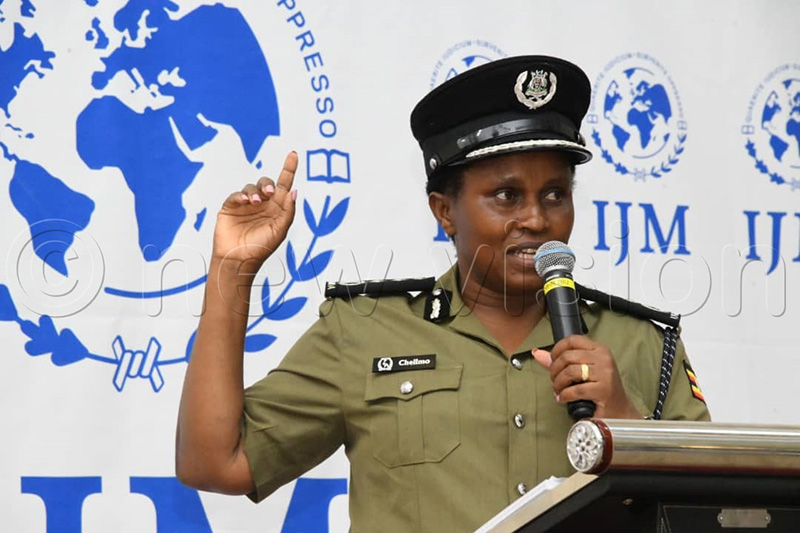
Criminal Investigations Directorate (CID) deputy director Chelimo Beata speaking during the launch of the report. (Photo by Mpalanyi Ssentongo)
She, however, welcomed efforts to engage both government and non-government actors for a solution.
Juliet Nafuna Musoke, one of the violence survivors and the country director of Redeem International Sawiya Lakareber Global Survivors Network, emphasised the need for all-around support to survivors.